|
|
|
Sort Order |
|
|
|
Items / Page
|
|
|
|
|
|
|
| Srl | Item |
| 1 |
ID:
126692
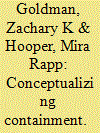

|
|
|
|
|
| Publication |
2013.
|
| Summary/Abstract |
Zachary K. Goldman and Mira Rapp-Hooper discuss American security interests in the Persian Gulf region and the prospects for effective cooperation among Gulf States to contain Iran. They ?nd that it is unlikely that the United States will be able to establish a containment regime that relies upon the Gulf Cooperation Council and that informal, bilateral ties to states in the region are a preferable policy recourse.
|
|
|
|
|
|
|
|
|
|
|
|
|
|
|
|
| 2 |
ID:
126694
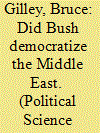

|
|
|
|
|
| Publication |
2013.
|
| Summary/Abstract |
THE WAVE OF PRO-DEMOCRACY MOVEMENTS and openings that swept the greater Middle East region in 2010-2012 caught the world by surprise. While the future of these openings is uncertain, their occurrence, as well as democratic changes in the region since 2001, are in need of explanation. What motivated and empowered the incidence of pro-democracy protest movements and regime liberalizations during this time?
|
|
|
|
|
|
|
|
|
|
|
|
|
|
|
|
| 3 |
ID:
126700
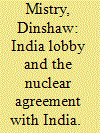

|
|
|
|
|
| Publication |
2013.
|
| Summary/Abstract |
IN JULY 2005, REVERSING DECADES OF U.S. nuclear nonproliferation policy, President George W. Bush announced a commitment to attaining "full civilian nuclear energy cooperation and trade with India."1 In November 2006, Congress passed the Henry J. Hyde United States-India Peaceful Atomic Energy Cooperation Act and, in October 2008, approved the necessary follow-on legislation, to formally permit civilian nuclear trade with India. The nuclear agreement with India was a major U.S. foreign policy initiative, and Indian Americans strongly lobbied Congress to approve this agreement. To some, this advocacy effort heralded the emergence of Indian Americans as a leading ethnic lobby that could substantially influence future U.S. foreign policy
|
|
|
|
|
|
|
|
|
|
|
|
|
|
|
|
| 4 |
ID:
126695
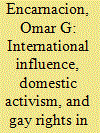

|
|
|
|
|
| Publication |
2013.
|
| Summary/Abstract |
IN JULY 2010, ARGENTINA BECAME THE FIRST NATION in Latin America, and only the second one in the developing world after South Africa, to pass a law legalizing same-sex marriage; shortly thereafter, the country enacted what is arguably the most progressive transgender law of any country in the world. It allows for a change of gender without undergoing surgery or receiving authorization from a doctor or a judge. Both laws have put Argentina in a select group of nations regarded as being on the cutting edge of gay rights and atop international rankings of countries most open to issues of concern to the lesbian/gay/bisexual/transgender (LGBT) community, such as the recently developed "Gay Friendliness Index."1 Neither societal factors nor political conditions could have predicted this cascade of gay rights advances.
|
|
|
|
|
|
|
|
|
|
|
|
|
|
|
|
| 5 |
ID:
126693
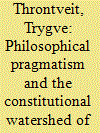

|
|
|
|
|
| Publication |
2013.
|
| Summary/Abstract |
AS THE DUST STILL SWIRLS, ENDLESSLY IT SEEMS, around the 2012 election, it is worth reexamining its predecessor of a century ago: the epochal election of 1912. Granted, 1912 was a four-way race, pitting Democratic and Republican nominees against challengers from the Socialist and Progressive Parties-a far cry from today's bipolar contests. Yet then as now, the political climate was highly charged, and the main question dividing the nation essentially the same: How should government protect freedom and promote opportunity while reducing inequality and ameliorating its effects? These general similarities suggest two particular reasons to study the course and consequences of the 1912 election. First, today's American system can be traced in important ways to its outcome, which put Woodrow Wilson in the White House after a sophisticated rhetorical battle that clarified his vision for American democracy and shaped the policies he devised to achieve it. Those policies laid the grounds for the American welfare state that emerged under Franklin D. Roosevelt, and thus mark, if not a constitutional revolution on the scale of the New Deal, a watershed: a diversion of ideological currents and institutional inertia that made subsequent changes possible. Second, both the campaign and Wilson's presidency were influenced, to an unrecognized degree, by a tradition of American philosophy that might offer intellectual resources for today's political tasks: philosophical pragmatism, a tradition popularized by William James and given explicit political content by his Progressive Era students and admirers.
|
|
|
|
|
|
|
|
|
|
|
|
|
|
|
|
|
|
|
|
|